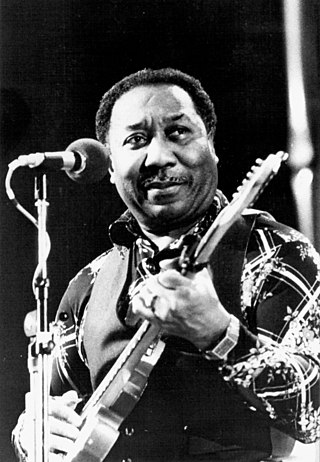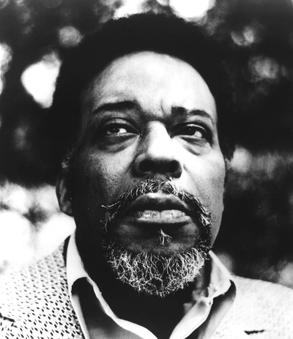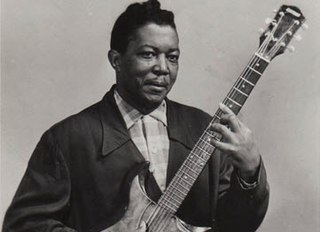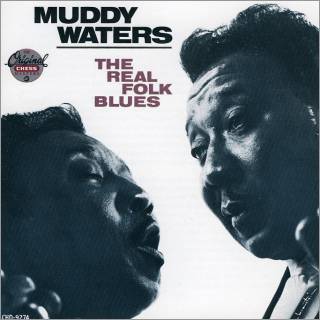Related Research Articles

McKinley Morganfield, known professionally as Muddy Waters, was an American blues singer and musician who was an important figure in the post-World War II blues scene, and is often cited as the "father of modern Chicago blues". His style of playing has been described as "raining down Delta beatitude".

Muddy Waters (1913–1983) was an American blues artist who is considered a pioneer of the electric Chicago blues and a major influence on the development of blues and rock music. He popularized several early Delta blues songs, such as "Rollin' and Tumblin'", "Walkin' Blues", and "Baby, Please Don't Go", and recorded songs that went on to become blues standards, including "Hoochie Coochie Man", "Mannish Boy", and "Got My Mojo Working". During his recording career from 1941 to 1981, he recorded primarily for two record companies, Aristocrat/Chess and Blue Sky; they issued 62 singles and 13 studio albums.

Aaron Thibeaux "T-Bone" Walker was an American blues musician, composer, songwriter and bandleader, who was a pioneer and innovator of the jump blues, West Coast blues, and electric blues sounds. In 2018 Rolling Stone magazine ranked him number 67 on its list of "The 100 Greatest Guitarists of All Time".

Chester Arthur Burnett, better known by his stage name Howlin' Wolf, was an American blues singer and guitarist. He was at the forefront of transforming acoustic Delta blues into electric Chicago blues, and over a four-decade career, recorded blues, rhythm and blues, rock and roll, and psychedelic rock. He is regarded as one of the most influential blues musicians of all time.
Leonard Samuel Chess, was a Polish-American record company executive and the co-founder of Chess Records. He was influential in the development of electric blues, Chicago blues, and rock and roll.

Chess Records was an American record company established in 1950 in Chicago, specializing in blues and rhythm and blues. It was the successor to Aristocrat Records, founded in 1947. It expanded into soul music, gospel music, early rock and roll, and jazz and comedy recordings, released on the Chess and its subsidiary labels Checker and Argo/Cadet. The Chess catalogue is owned by Universal Music Group and managed by Geffen Records and Universal Music Enterprises.

Eugene "Jug" Ammons, also known as "The Boss", was an American jazz tenor saxophonist. The son of boogie-woogie pianist Albert Ammons, Gene Ammons is remembered for his accessible music, steeped in soul and R&B.

Marion Walter Jacobs, known as Little Walter, was an American blues musician, singer, and songwriter, whose revolutionary approach to the harmonica had a strong impact on succeeding generations, earning him comparisons to such seminal artists as Django Reinhardt, Charlie Parker and Jimi Hendrix. His virtuosity and musical innovations fundamentally altered many listeners' expectations of what was possible on blues harmonica. He was inducted into The Rock and Roll Hall of Fame in 2008, the first and, to date, only artist to be inducted specifically as a harmonica player.

Aristocrat Records, sometimes billed as the Aristocrat of Records, was founded in April 1947 by Charles and Evelyn Aron, together with their partners Fred and Mildred Brount and Art Spiegel. By September, Leonard Chess had invested in the young record company. Over time, Leonard bought the others out, and by 1948, only he and Evelyn Aron ran the firm. By early 1950, Leonard and his brother Phil had become the sole owners, and in June of that year they changed the company's name from Aristocrat to Chess Records. The Aristocrat brand was officially discontinued in January 1951.

James Henry Cotton was an American blues harmonica player, singer and songwriter, who performed and recorded with many fellow blues artists and with his own band. He also played drums early in his career.

Miles Davis was an American trumpeter, bandleader and musical composer. His discography consists of at least 60 studio albums and 39 live albums, as well as 46 compilation albums, 27 box sets, 4 soundtrack albums, 57 singles and 3 remix albums.

Robert Lee McCollum was an American blues musician who played and recorded under the pseudonyms Robert Lee McCoy and Robert Nighthawk. He was the father of the blues musician Sam Carr. Nighthawk was inducted into the Blues Hall of Fame in 1983.
Ralph Basso Jr., known as Ralph Bass, was an American rhythm-and-blues record producer and talent scout for several independent labels. He was a pioneer in bringing African American music into the American mainstream. During his career he worked in key roles for Black & White Records, Savoy Records, King Records, Federal Records, and Chess Records, recording many leading performers, including Etta James, Sam Cooke, James Brown, Earl Bostic, and groups such as the Platters and the Dominoes. Bass was inducted into the Rock and Roll Hall of Fame in 1991 as a nonperformer.
"Wang Dang Doodle" is a blues song written by Willie Dixon. Music critic Mike Rowe calls it a party song in an urban style with its massive, rolling, exciting beat. It was first recorded by Howlin' Wolf in 1960 and released by Chess Records in 1961. In 1965, Dixon and Leonard Chess persuaded Koko Taylor to record it for Checker Records, a Chess subsidiary. Taylor's rendition quickly became a hit, reaching number thirteen on the Billboard R&B chart and number 58 on the pop chart. "Wang Dang Doodle" became a blues standard and has been recorded by various artists. Taylor's version was added to the United States National Recording Registry in 2023.

William Wright was an American singer. He is considered one of Little Richard's greatest influences in his formative years.
"Baby Face" Leroy Foster was an American blues singer, drummer and guitarist, active in Chicago from the mid-1940s until the late 1950s. He was a significant figure in the development of the postwar electric Chicago blues sound, particularly as a member of the Muddy Waters band during its formative years.
Ernest Alvin Archia, Jr. known as Tom Archia, was an American jazz tenor saxophonist.

The Real Folk Blues is a 1965 compilation album of Muddy Waters recordings, released on the Chess record label in January 1965. The album was the first release of The Real Folk Blues series and has since been re-released in multiple formats. The album features some of Waters' first recordings.
The Macomba Lounge, at 3905 South Cottage Grove, Chicago, was an after-hours music club owned by Leonard Chess from 1946 to October 1950, when it burned down.
References
- 1 2 3 "Andrew Tibbs: Biography". Allmusic.com. Retrieved July 26, 2011.
- 1 2 3 Thedeadrockstarsclub.com. Accessed July 2011.
- ↑ Room, Adrian (2010). Dictionary of Pseudonyms: 13,000 Assumed Names and Their Origins (5th ed.). Jefferson, North Carolina: McFarland & Company. p. 475. ISBN 978-0-7864-4373-4.
- 1 2 3 4 5 "Andrew Tibbs: Biography". Music.us. Archived from the original on September 27, 2011. Retrieved July 26, 2011.
- 1 2 3 "Andrew Tibbs: Classics 1947–1951". Discovery-records.com. Archived from the original on October 2, 2011. Retrieved July 26, 2011.
{{cite web}}: CS1 maint: unfit URL (link) - ↑ "1947–1951". Allmusic.com. Retrieved July 26, 2011.